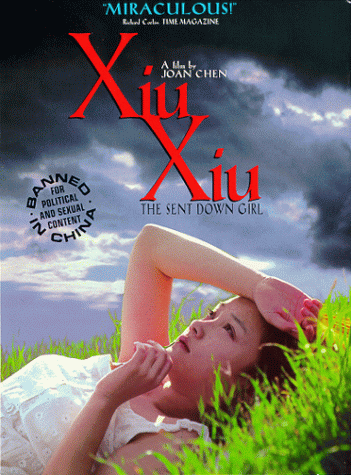Chinese Tragedy - - Xiu Xiu the Sent Down Girl
Genre: Historical Drama
Grade = B+
Chinese with English subtitles

Between 1967 and 1976, nearly eight million Chinese youths were "sent down" for specialized
training to the remotest corners of the country, under a campaign known as the Cultural Youth
Revolution. A part of the disastrous Cultural Revolution. This is the story of Wen Xiu, known to
her friends as Xiu Xiu. At the age of 15 she becomes one of these ‘educated youths’ and is sent
to Tibet. After a short time at a village iron foundry, she is sent out onto the Tibetan plains to
train in horse herding for six months so that she may be considered for the illustrious Girls' Iron
Calvary. She is assigned to Loa Jim, a solitary horseherder who lives in a weatherbeaten tent on
the Tibetan high plains. However, she will never fear getting molested by him. He lost that
ability in the Tibetan invasion.
After her arrival at their camp, Xiu Xiu, having grown up in the city, is not enamored with the idea of living in a tent with a strange man and complains bitterly, waiting for the time when she can finally go home. However, Loa Jim quickly grows very fond of her company and sets about to try to please her when he can, despite the fact she is contemptuous of him.
Six months pass, and no one has come to get her. More time passes. It seems that they have forgotten about her. She soon learns from a passing peddler that the calvary unit has been disbanded after the educated youths riot. Even more disturbing to her is the news that only those with special travel permits can return home, and those are few and far between, given only to a luck few who are able to bribe party officials in the village. However, she has nothing to bribe them with. Nothing that is, except herself.
She is soon whoring herself out to every passing official to try to get one of the travel passes and gets a nasty reputation in the village. This infuriates Loa Jim and after he takes her to the village to confront the party officials, she collapses and has a miscarriage at the hospital. We soon learn things are so bad, the male educated youths are down to chopping off their toes in order to get a travel pass. This is a tragedy in the Shakespearian sense. Lost youthful innocence, unrequited love and finally death.
Directed by Joan Chen from the award-winning novella by Yan Geling, the films features many sweeping panoramas of the Tibetan plain. Mostly grass, hills, clouds and the occasional flower. However, this does not exactly look that different than western Oklahoma. A whole lot of nothing after you see it for the first time. Although the cinematography is superior, what is surprising is the great amount of the story that takes place in the tent. This gives the film a claustrophobic feel that is set in the middle of emptiness. The story also effectively shows the underlying corruption of the communist system that set these poor bastards out to the middle of nowhere and left them there. Many are still there to this day. That commentary, and sex scenes that would only get a PG-13 rating in the US was enough to get this film banned in China.
The subtitling was excellent and could be easily read throughout the feature (unreadable subtitles are one of my great pet peeves). The performances of the two main characters are surprisingly modern considering many Chinese films tend have a lot of the characters overact melodramatically as they have been trained in the Chinese theater. Astonishingly, quite a lot of the acting was through nonverbal communication, something I have rarely seen in a Chinese film. Although the ending scene at first felt a bit contrived and melodramatic, I have begun to appreciate its subtlety after spending some time considering it. Now I wish I still had the tape and could go back over some of the significant scenes to better understand them. Overall worth a look.
Back to Ryanburg's Reel Reviews
The Intelligent Person's Guide to Anime
Ryanburg's Home Planet